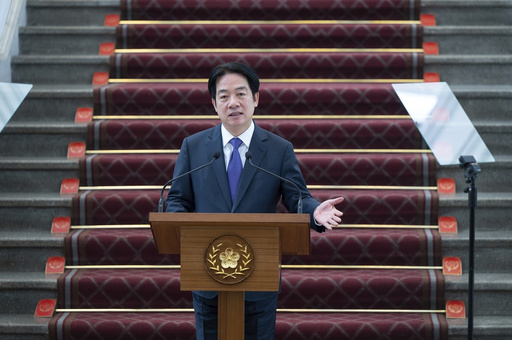BEIJING – On Monday, China’s Foreign Ministry expressed strong disapproval regarding a recently updated U.S. government fact sheet that eliminated a statement affirming American opposition to Taiwan’s independence. Ministry spokesperson Guo Jiakun criticized this alteration, accusing the United States of “gravely backpedaling” on its stance concerning Taiwan and conveyed that it sends an inappropriate signal to “separatist forces” on the island.
The historical backdrop of Taiwan and China’s separation dates back to 1949, following a civil war that ultimately placed the communists in power in mainland China. The Nationalists, who were defeated in the conflict, retreated to Taiwan, establishing a rival governance there. While Taiwan operates with its own government and military, it has not formally declared independence from China.
In response to media inquiries about the revised fact sheet, Guo urged the U.S. to cease any actions that could bolster and support Taiwan independence. He emphasized the need for the United States to prevent further harm to China-U.S. relations and to maintain peace and stability in the Taiwan Strait, which is the waterway separating Taiwan from mainland China.
Last week, the U.S. State Department made the change by omitting the phrase “we do not support Taiwan independence” from the document detailing America’s relationship with the self-ruled island, which is available on its official website. Taiwan’s government expressed support for this adjustment, though their statement refrained from directly addressing the specific language that was removed. They noted that the U.S. State Department’s update reflected a positive and friendly language that underscores the close partnership between Taiwan and the United States.
This is not the first instance of the State Department altering this particular phrasing; a similar removal occurred in May 2022 but was later reinstated following strong objections from China. The reasons behind this latest language change remain unclear, and it raises questions about potential shifts in U.S. policy under the leadership of President Donald Trump, who assumed office again last month.
Taiwan’s government has expressed concern that Trump may not offer the same level of support that previous President Joe Biden provided. Although the U.S. does not officially recognize Taiwan as an independent nation, it is recognized as its most significant supporter and primary supplier of military assistance.
Recently, Trump remarked that Taiwan, known for being a prominent semiconductor manufacturer, has claimed a large share of the chip market that traditionally belonged to the U.S., indicating that he wants to see a reversal of this trend. Meanwhile, China emphasizes that Taiwan must ultimately fall under its control and has ramped up military maneuvers around the island in recent years. The U.S. government’s fact sheet indicates a preference for resolving differences through peaceful means, without coercion, in a manner that is acceptable to the people on both sides.




